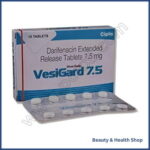ADDICTION
ALCOHOL DEPENDENCE
QUIT SMOKING
ALLERGY
ANTI FUNGAL
FUNGAL INFECTION
FUNGAL NAIL INFECTIONS
ANTI-REJECTION DRUGS
ANTI WORM
ANTIBIOTIC
BACTERIAL INFECTIONS
ARTHRITIS
GOUT
OSTEOARTHRITIS
RHEUMATOID ARTHRITIS
BLOOD
LOW PLATELET COUNT
THROMBOPHLEBITIS
VARICOSE VEINS
COLON
ANAL FISSURE
PILES
ULCERATIVE COLITIS
DIABETES CARE
DIABETES INSIPIDUS
DIABETES TYPE
DIABETIC FOOT ULCERS
GLUCOSE MONITOR
EYES/EAR CARE
DRY EYES
EYE CARE
EYE EXAMINATION
EYE INFECTION
EYE LASHES
EYE PAIN
GLAUCOMA
OCULAR HYPERTENSION
UVEITIS
FEVER CARE
MALARIA
RHEUMATIC FEVER
TYPHOID FEVER
GASTROINTESTINAL
ACIDITY
CONSTIPATION
CROHN'S DISEASE
DIARRHOEA
GALLBLADDER STONES
INTESTINAL ULCERS
IRRITABLE BOWEL SYNDROME
MOTION SICKNESS
NAUSEA
Vesigard (Darifenacin)
Vesigard 7.5 mg (Darifenacin)
Vesigard 15 mg (Darifenacin)
| Active Ingredient (Generic Name): | Darifenacin |
|---|---|
| Indication: | Overactive bladder (OAB) symptoms |
| Manufacturer | Cipla Limited |
| Packaging: | 10 tablet er in one strip |
From: $51.00
Vesigard (Darifenacin) is a medication prescribed to help manage overactive bladder symptoms by relaxing bladder muscles, increasing bladder capacity, reducing incontinence episodes, and ultimately improving daily comfort and well-being. It works by blocking specific receptors in the bladder and is commonly prescribed for neurogenic detrusor overactivity (NDO) to enhance bladder control and lessen the frequency and urgency of urination episodes. To use Vesigard effectively, make sure to follow your healthcare provider’s instructions, maintain a consistent dosing schedule, and refrain from adjusting the dosage without consulting them. Special precautions include reviewing medical history, checking for eye conditions like glaucoma, and discussing any urinary retention or gastrointestinal issues before starting the medication. By prioritizing your health and well-being while using Vesigard, you can effectively manage overactive bladder symptoms.
Start here by taking a moment to understand the key benefits of Vesigard for managing overactive bladder symptoms. Vesigard, also known as darifenacin, is a medication prescribed to help control the symptoms of overactive bladder, such as frequent urination, urgency, and incontinence. By taking Vesigard as directed by your healthcare provider, you can experience improvements in bladder control, leading to a reduction in the number of trips to the bathroom and fewer incidents of urgency.
One of the primary benefits of Vesigard is its ability to relax the bladder muscles, which helps decrease the sudden and frequent urge to urinate. This medication works by blocking certain receptors in the bladder, which ultimately leads to an increase in the bladder’s capacity to hold urine. Additionally, Vesigard can help reduce episodes of incontinence, providing you with greater confidence and improved quality of life. Overall, Vesigard plays a pivotal role in managing overactive bladder symptoms and can enhance your daily comfort and well-being.
Why is this medication prescribed?
To understand why Vesigard (Darifenacin) is prescribed, it is important to recognize the specific medical conditions for which this medication is intended. Vesigard is primarily prescribed to treat overactive bladder (OAB) symptoms such as frequent urination, urgency to urinate, and incontinence. Overactive bladder is a condition where the bladder muscles contract uncontrollably, leading to these bothersome symptoms. Darifenacin, the active ingredient in Vesigard, works by blocking specific receptors in the bladder, which helps relax the bladder muscle and increase the bladder’s capacity to hold urine.
Doctors may also prescribe Vesigard for patients with neurogenic detrusor overactivity (NDO), a condition where nerve damage affects bladder function, causing similar symptoms as OAB. By targeting the underlying causes of these conditions, Vesigard can help improve bladder control and reduce the frequency and urgency of urination episodes. It is essential to follow your healthcare provider’s instructions carefully when taking Vesigard to guarantee the best treatment outcomes.
How should this medicine be used?
You should take Vesigard (Darifenacin) exactly as directed by your healthcare provider. This medication is typically taken by mouth with or without food, usually once a day. It’s important to swallow the tablet whole without crushing or chewing it. Remember to take Vesigard at the same time each day to help maintain a consistent level of the drug in your body. If you forget a dose, take it as soon as you remember, unless it’s close to the time for your next dose. In that case, skip the missed dose and continue with your regular dosing schedule. Do not take a double dose to make up for a missed one. It’s vital to follow the prescribed dosage and not adjust it without consulting your healthcare provider. If you experience any side effects or have concerns about how to take Vesigard, contact your healthcare provider for guidance.
Other uses for this medicine
For other uses, Vesigard (Darifenacin) may be prescribed by healthcare providers to treat conditions such as overactive bladder or urinary incontinence. Overactive bladder is a condition characterized by a sudden urge to urinate, often leading to involuntary leakage of urine. Darifenacin works by relaxing the bladder muscles, helping to reduce these urgent feelings and control urine leakage. It is important to follow your healthcare provider’s instructions carefully when using Vesigard for these conditions.
Urinary incontinence, another condition Vesigard may be used for, involves the unintentional loss of urine. This medication can help manage this by improving bladder control and reducing the frequency of involuntary urine leakage episodes. It is essential to discuss any symptoms you are experiencing with your healthcare provider to determine if Vesigard is an appropriate treatment option for you.
What special precautions should I follow?
Prior to beginning Vesigard (Darifenacin), it is important to review your medical history to confirm it is safe for you to use this medication. Understanding any previous conditions or medications you have taken will assist your healthcare provider in determining the best course of action. This precaution is taken to prioritize your health and well-being while using Vesigard (Darifenacin).
Check Medical History
When considering Vesigard (Darifenacin), make sure to review your medical history thoroughly to identify any potential risks or contraindications.
- Check for Glaucoma: Confirm with your healthcare provider any history of glaucoma or other eye conditions, as Vesigard can worsen these conditions.
- Inform about Urinary Retention: Notify your doctor if you have a history of urinary retention, as this medication may exacerbate this condition.
- Discuss Gastrointestinal Issues: Mention any gastrointestinal problems you have experienced, as Vesigard may cause side effects such as constipation or stomach pain.
What special dietary instructions should I follow?
To maintain the effectiveness of Vesigard (Darifenacin), it is important to adhere to specific dietary instructions. When taking Vesigard, it is recommended to avoid consuming grapefruit or grapefruit juice. Grapefruit can interact with Darifenacin and lead to increased levels of the medication in your body, potentially causing more side effects. Additionally, it is advisable to stay hydrated by drinking an adequate amount of water throughout the day. Proper hydration can help reduce the risk of certain side effects like constipation that may occur while taking Vesigard.
Furthermore, it is essential to maintain a balanced diet rich in fruits, vegetables, whole grains, and lean proteins. A healthy diet can contribute to overall well-being and may positively impact your bladder health, complementing the effects of Vesigard. It is also beneficial to limit the intake of caffeine and alcohol, as these substances can irritate the bladder and worsen symptoms of overactive bladder. By following these dietary recommendations, you can support the effectiveness of Vesigard in managing your condition.
What should I do if I forget a dose?
If you forget a dose of Vesigard (Darifenacin), take it as soon as you remember. However, if it is almost time for your next scheduled dose, skip the missed dose and continue with your regular dosing schedule. Do not double up on doses to make up for the missed one, as this can increase the risk of side effects.
It is important to try and take Vesigard at the same time every day to maintain a consistent level of the medication in your body. Setting up reminders or incorporating it into your daily routine can help you remember to take your doses regularly.
If you frequently forget to take your medication, consider using a pill organizer or setting alarms on your phone to help you stay on track. If you continue to struggle with remembering your doses, speak to your healthcare provider for further guidance on how to manage your medication schedule effectively.
What side effects can this medication cause?
You may experience side effects while taking Vesigard (Darifenacin). It’s important to monitor your symptoms closely, as some side effects can be serious. If you notice any concerning symptoms, such as severe dizziness or difficulty breathing, contact your doctor immediately.
Monitor Symptoms Closely
Regularly monitor your body for potential side effects while taking Vesigard (Darifenacin). Some side effects may occur as your body adjusts to the medication. Keep a close eye on the following:
- Dry mouth: This is a common side effect of Vesigard. Stay hydrated and consider sugar-free gum or candies to help with dry mouth.
- Constipation: Vesigard can sometimes lead to constipation. Make sure you are consuming an adequate amount of fiber and staying active to help prevent this.
- Blurred vision: In some cases, Vesigard may cause blurred vision. If you experience this, refrain from driving or operating machinery until your vision clears up.
Some side effects can be serious. If you experience any of the following symptoms, call your doctor immediately:
Be vigilant for any of the following serious side effects that may arise while taking Vesigard (Darifenacin) and promptly contact your doctor if you experience them. Some side effects can be severe and require immediate medical attention. These include:
- Severe allergic reactions such as rash, itching, swelling of the face, tongue, or throat, severe dizziness, or trouble breathing.
- Difficulty emptying your bladder or painful urination.
- Eye pain or discomfort, blurred vision, or seeing halos around lights.
If you encounter any of these symptoms, do not hesitate to seek medical help. Your doctor will be able to provide guidance on the appropriate steps to take in response to these serious side effects.
What should I know about the storage and disposal of this medication?
When storing Vesigard (Darifenacin), make sure it is kept in a cool, dry place away from direct sunlight and moisture. The ideal storage temperature typically ranges between 68?F to 77?F (20?C to 25?C). Avoid keeping it in the bathroom or kitchen, where humidity levels can be higher. Keep the medication in its original packaging or container to protect it from light and moisture. Ensure that Vesigard is out of reach of children and pets, as it should only be used by the individual prescribed the medication.
Disposing of Vesigard should be done carefully. Do not flush it down the toilet or pour it down the drain unless instructed to do so. Instead, it is recommended to consult with a pharmacist or local waste disposal company on the proper disposal methods. They can provide guidance on how to safely dispose of the medication to prevent any potential harm to others or the environment. If you have any expired or unused Vesigard, it is advisable to dispose of it promptly following the recommended guidelines.
In case of an emergency/overdose
In the event of an emergency or overdose involving Vesigard (Darifenacin), promptly seek medical assistance by contacting poison control or visiting the nearest hospital. If you suspect an overdose or experience severe symptoms such as difficulty breathing, extreme drowsiness, confusion, or hallucinations, do not hesitate to seek immediate help. It is essential to provide healthcare professionals with as much information as possible, including the amount of medication taken and the time of ingestion.
While waiting for medical help, avoid taking any other medications unless instructed by a healthcare provider. Do not induce vomiting unless advised by poison control or a healthcare professional. Stay calm and try to stay conscious of any changes in your symptoms. It is important to note that overdosing on Vesigard can lead to serious complications, so seeking prompt medical attention is paramount. Remember, quick action in these situations can be life-saving, and healthcare professionals are equipped to provide the necessary care and support.
What other information should I know?
If you experience any persistent or concerning side effects while using Vesigard (Darifenacin), it is important to inform your healthcare provider promptly. Some side effects may necessitate medical attention, such as severe allergic reactions, difficulty breathing, swelling of the face, lips, throat, or tongue, or severe dizziness. It is vital to follow your healthcare provider’s instructions carefully when taking Vesigard to guarantee its effectiveness and minimize the risk of adverse effects.
Inform your healthcare provider about all your current medications, including over-the-counter drugs, vitamins, and herbal supplements, before starting Vesigard. Certain medications may interact with Vesigard, potentially affecting its efficacy or increasing the risk of side effects.
Additionally, it is important to attend all scheduled doctor appointments to monitor your response to Vesigard and address any concerns or changes in your condition. Do not adjust your dosage or stop taking Vesigard without consulting your healthcare provider first. Adhering to your prescribed treatment plan can help manage your symptoms effectively and improve your quality of life.
Brand names
To identify Vesigard (Darifenacin) under different commercial names, you can refer to its brand names in various markets. The table below provides a summary of the brand names of Vesigard (Darifenacin) in different countries:
| Country | Brand Name |
|---|---|
| United States | Enablex |
| Canada | Emselex |
| Europe | Darilong, Darifen |
In the United States, Vesigard is known as Enablex, while in Canada, it is marketed under the name Emselex. In European markets, Vesigard can be found under the brand names Darilong and Darifen. These brand names are used to market the same medication, Darifenacin, under different names in various regions. Being mindful of these brand names when seeking Vesigard (Darifenacin) in pharmacies or discussing it with healthcare providers, particularly if you are traveling or residing in different countries, is crucial.
Purchase Options and Locations
Exploring where you can buy Vesigard (Darifenacin) and the available locations is vital for obtaining the medication. Vesigard is a prescription medication used to treat overactive bladder symptoms such as frequent urination, urgency, and incontinence. You can purchase Vesigard at various locations, including local pharmacies, online pharmacies, and through mail-order services. Most brick-and-mortar pharmacies stock Vesigard, but availability may vary, so it’s advisable to call ahead to make sure they have it in stock. Online pharmacies offer the convenience of ordering from home and may provide discounts or bulk purchase options. However, it’s essential to verify the legitimacy of online pharmacies to avoid counterfeit products.
Additionally, some insurance plans may cover the cost of Vesigard, reducing the out-of-pocket expenses. You can check with your insurance provider or pharmacist to inquire about coverage options. Mail-order services are another convenient way to obtain Vesigard, especially for refills. By understanding these purchase options and locations, you can guarantee a seamless process in acquiring Vesigard for your medical needs.
To summarise
To sum up, grasping the different purchase choices and places for acquiring Vesigard is crucial for guaranteeing a seamless process of getting the medication. Understanding where you can purchase Vesigard, whether it be at local pharmacies, online retailers, or through mail-order pharmacies, gives you the flexibility to choose the most convenient option for your needs. Local pharmacies offer the advantage of immediate access to the medication, allowing you to start treatment promptly. Online retailers provide the convenience of ordering from the comfort of your own home and having the medication delivered to your doorstep. Mail-order pharmacies offer a convenient option for obtaining Vesigard in bulk, which can be beneficial for long-term treatment plans. By being aware of these purchase choices and locations, you can effectively manage your supply of Vesigard and guarantee a continuous and hassle-free experience in obtaining your prescribed medication.








